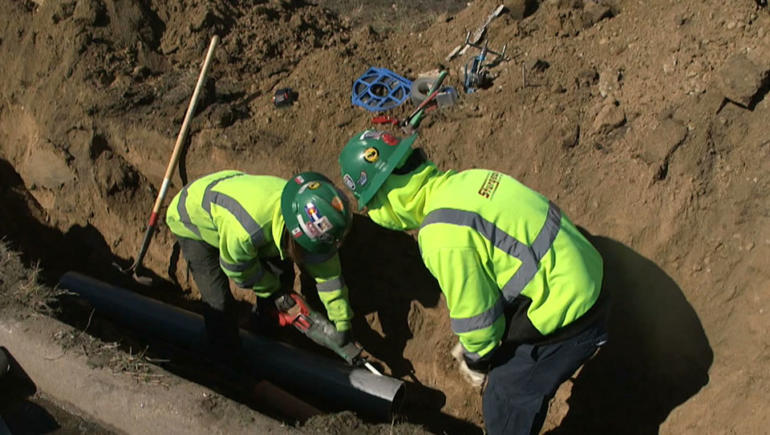Twenty-eight-year-old Mara Picazo has embarked on a new career, one she never envisioned: construction.
“I actually never thought I would be able to do it,” Picazo said, alluding to her diminutive frame.
At age 45, Che Derrera has gone from an indoor office job to traffic signal apprentice.
“There’s pros and cons,” Derrera said, during a brief break from his job. “Out here in like 12-degree weather sometimes, it’s kind of hard.”
CGTN’s Hendrik Sybrandy reports.
They’re two of some 700 people who’ve enrolled in WorkNow, a one-year-old city of Denver program that hires people to work on big infrastructure projects, like Central 70, the $1 billion plus renovation of Interstate 70.
“There was a real concern by both contractors and project owners and also training programs that we need to do a better job at broadening the pipeline and getting more workers into the industry,” said Katrina Wert with Community College of Denver-based Center for Workforce Initiatives.
Wert said the low U.S. unemployment rate of 4.0 percent and an aging workforce have helped cause a 30,000 worker shortfall in the construction industry in the Denver metro area alone.
That’s why the Colorado Homebuilding Academy and a dozen other schools and organizations have teamed up to prepare local residents for construction careers, training them if necessary.
“A lot of these folks haven’t picked up a hammer before or a power tool,” said Robert Hernandez, the Academy’s Operations Manager. “So we’re teaching them the absolute basics and the foundation. How to do it properly, how to do it safely.”
WorkNow relies on a variety of public and private funding. It provides a menu of job-related services to employees, including child care, transportation, right down to work boots.
“The intake process starts with an assessment,” Wert said. “Who are you, what are your strengths, where do you want to go in this industry. And then services are determined from that point.”
Wert said these kind of major construction projects can sometimes have a negative effect on surrounding neighborhoods. So WorkNow strives to create economic opportunities for people who live there.
“It is the responsibility of us as citizens of Denver to ensure that we’re looking out for our neighbors,” she said.
Other U.S. cities are doing very similar things. Picazo, who works for Sturgeon Electric Company, hopes to start her own company one day.
“I guess I like hard work,” Picazo said. “I like to prove myself. So a challenge is always good.”
“It’s a little late to change career path,” Derrera, who also works for Sturgeon Electric, said. “But the opportunity and camaraderie of the guys I work with, it was a smooth transition.”
Coordinating all of its moving parts has been a challenge for WorkNow but with more big-scale work on the way in Denver, the need to attract quality labor is not going away.
“We’re making construction sexy again,” Hernandez said with a laugh.
 CGTN America
CGTN America

